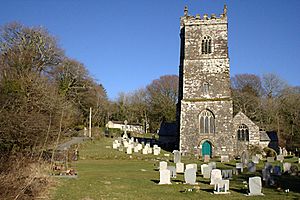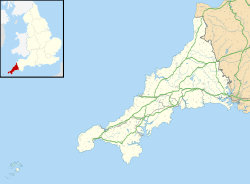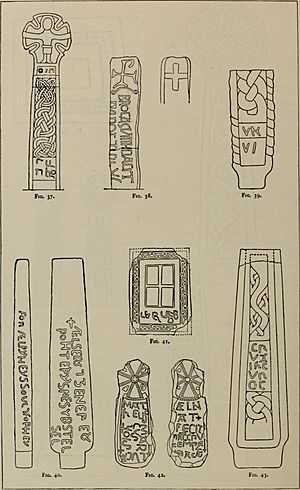St Julitta's Church, Lanteglos-by-Camelford facts for kids
Quick facts for kids St Julitta’s Church, Lanteglos-by-Camelford |
|
|---|---|

St Julitta’s Church, Lanteglos-by-Camelford
|
|
| 50°37′26.6″N 04°40′38″W / 50.624056°N 4.67722°W | |
| OS grid reference | SX 08815 82343 |
| Location | Lanteglos-by-Camelford, Cornwall |
| Country | England |
| Denomination | Church of England |
| History | |
| Dedication | St Julitta |
| Administration | |
| Parish | Lanteglos by Camelford with Advent |
| Deanery | Trigg Minor and Bodmin |
| Archdeaconry | Bodmin |
| Diocese | Truro |
| Province | Canterbury |
St Julitta's Church in Lanteglos-by-Camelford, Cornwall, is a very old and important church. It's part of the Church of England and is considered a "Grade I listed" building, which means it's a special historical site. Another church, St Julitta's Church, St Juliot, is also named after the same local saint.
Contents
History of the Church
St Julitta's Church has been around for a very long time. It was first built in the 12th century, which means it's over 800 years old! The tall tower you see today was added later, in the 14th century.
Changes Over Time
In the 15th century, more parts were added to the church. This included a long section on the south side called a aisle, and possibly the south porch, which is like an entrance area.
The church has also been repaired and updated many times.
- In 1860, the roof of the church was replaced.
- Starting in 1865, a famous architect named James Piers St Aubyn began a big restoration project. This work was finished enough by August 1867 for the church to reopen, but more repairs continued.
- Even more restoration work was done in 1873 to keep the church in good condition.
Church Community
St Julitta's Church is part of a group of churches that work together. This group is called a "joint benefice."
Connected Churches
The churches that are part of this group are:
Special Memorials
Inside the church, you can find memorials that remember people from the past. One notable memorial is for W. Inch, who passed away in 1815. This memorial was created by Robert Isbell from Stonehouse.
The Church Organ
The church once had an organ that was built around 1793 by William Allen of London. Organs are large musical instruments that make sound using pipes. You can find details about this organ in the National Pipe Organ Register, which keeps records of organs. This organ was removed from the church in 1986.
Church Bells
The tower of St Julitta's Church holds a set of 6 bells. These bells are rung together to create music.
Bell History
- Four of the bells are very old, dating back to 1783. They were made by John II Pennington and Christopher IV Pennington.
- The other two bells are newer, from 1883, and were made by a company called John Warner & Sons.
Ancient Churchyard Crosses
The churchyard at St Julitta's is famous for its four medieval "wheel-headed crosses." These are old stone crosses with a circle shape at the top.
The Inscribed Stone
There is also a special stone from the 10th century with writing carved into it. This stone was found on a farm called Castle Goff in 1858 and was moved to the church in 1900. It is now protected as a "scheduled monument," meaning it's an important historical artifact.
The writing on the stone is very old Anglo-Saxon and can be hard to read. One way to understand it is: "Aelsel and Genere made this family stone or place of peace for Aelwine's soul and for themselves or Heysel." Another way to read it is: "Alseth and Generth wrought this personal memorial for Aelwine and for themselves." This stone gives us a glimpse into the lives and beliefs of people who lived many centuries ago.
 | Roy Wilkins |
 | John Lewis |
 | Linda Carol Brown |



